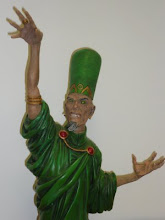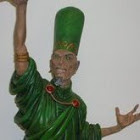 Socrates' trial and death gave Western philosophy its first martyr, the problem with martyrdom is that the act itself obliterates the context it occurred in. In this very engaging and well written book Robin Waterfield rescues Socrates from this fate and makes the event both much more ordinary and far more interesting. As a martyr Socrates moved beyond ordinary comprehension to a very extreme location that is removed from history. Instead of being an event taking place within a web of human social, cultural and political events and forces, it is a pristine event.
Socrates' trial and death gave Western philosophy its first martyr, the problem with martyrdom is that the act itself obliterates the context it occurred in. In this very engaging and well written book Robin Waterfield rescues Socrates from this fate and makes the event both much more ordinary and far more interesting. As a martyr Socrates moved beyond ordinary comprehension to a very extreme location that is removed from history. Instead of being an event taking place within a web of human social, cultural and political events and forces, it is a pristine event.This is remarkably convenient for anyone who wants to use the event to pursue their own agenda, the martyr is such an abstract that they can be usefully adapted to pretty much any purpose. Robin Waterfield manages to place Socrates back into his historical context and in doing so makes the event much more comprehensible and meaningful.
Over the course of Socrates life Athens underwent a protracted and very violent transition from a self-confident, aggressive empire to a severely humbled and insecure city state and it is this development that forms the missing context for the trial and death of Socrates. As Robin Waterfield makes clear Socrates was a political philosopher, he was deeply concerned with the best way to organise a society as the means to develop the best humans. At a time of colossal political upheaval, in particular upheaval that leads to destruction, loss of prestige and social uncertainty being a political philosopher can be a dangerous profession.
The other aspect of Athenian life that is nearly impossible to understand at this distance is the fundamental importance of religion, so fundamental that it was effectively invisible as much as air is. A key part of this belief was the favour or disfavour of the gods as an explanation for major or minor events. The string of disasters that Athens had suffered would have been understood as a clear sign of divine displeasure, and divine displeasure had to have a cause.
Robin Waterfield makes a very persuasive case that Socrates, by his own determined actions and choices was very well positioned to be identified by a nervous and deeply unsettled Athenian society as a source of political, social and divine trouble making and that his trial and death sentence were the direct result of that. By dispelling the myths of martyrdom Socrates is rescued as a fascinating figure from a pivotal time in world history. Clear, articulate and very thoughtful this is great read, clearing away myths to show the far more engaging history.


No comments:
Post a Comment